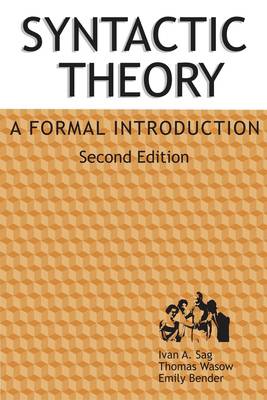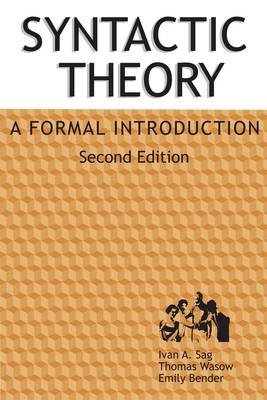
- Afhalen na 1 uur in een winkel met voorraad
- Gratis thuislevering in België vanaf € 30
- Ruim aanbod met 7 miljoen producten
- Afhalen na 1 uur in een winkel met voorraad
- Gratis thuislevering in België vanaf € 30
- Ruim aanbod met 7 miljoen producten
Zoeken
Syntactic Theory
A Formal Introduction, 2nd Edition Volume 152
Ivan A Sag, Thomas Wasow, Emily M Bender
€ 63,95
+ 127 punten
Omschrijving
This second edition of Syntactic Theory: A Formal Introduction expands and improves upon a truly unique introductory syntax textbook. Like the first edition, its focus is on the development of precisely formulated grammars whose empirical predictions can be directly tested. There is also considerable emphasis on the prediction and evaluation of grammatical hypotheses, as well as on integrating syntactic hypotheses with matters of semantic analysis. The book covers the core areas of English syntax from the last quarter century, including complementation, control, "raising constructions," passives, the auxiliary system, and the analysis of long distance dependency constructions. Syntactic Theory's step-by-step introduction to a consistent grammar in these core areas is complemented by extensive problem sets drawing from a variety of languages. The book's theoretical perspective is presented in the context of current models of language processing, and the practical value of the constraint-based, lexicalist grammatical architecture proposed has already been demonstrated in computer language processing applications. This thoroughly reworked second edition includes revised and extended problem sets, updated analyses, additional examples, and more detailed exposition throughout. Praise for the first edition:
"Syntactic Theory sets a new standard for introductory syntax volumes that all future books should be measured against."--Gert Webelhuth, Journal of Linguistics
"Syntactic Theory sets a new standard for introductory syntax volumes that all future books should be measured against."--Gert Webelhuth, Journal of Linguistics
Specificaties
Betrokkenen
- Auteur(s):
- Uitgeverij:
Inhoud
- Aantal bladzijden:
- 608
- Taal:
- Engels
- Reeks:
- Reeksnummer:
- nr. 152
Eigenschappen
- Productcode (EAN):
- 9781575864006
- Verschijningsdatum:
- 1/04/2003
- Uitvoering:
- Paperback
- Formaat:
- Trade paperback (VS)
- Afmetingen:
- 179 mm x 258 mm
- Gewicht:
- 1061 g

Alleen bij Standaard Boekhandel
+ 127 punten op je klantenkaart van Standaard Boekhandel
Beoordelingen
We publiceren alleen reviews die voldoen aan de voorwaarden voor reviews. Bekijk onze voorwaarden voor reviews.











